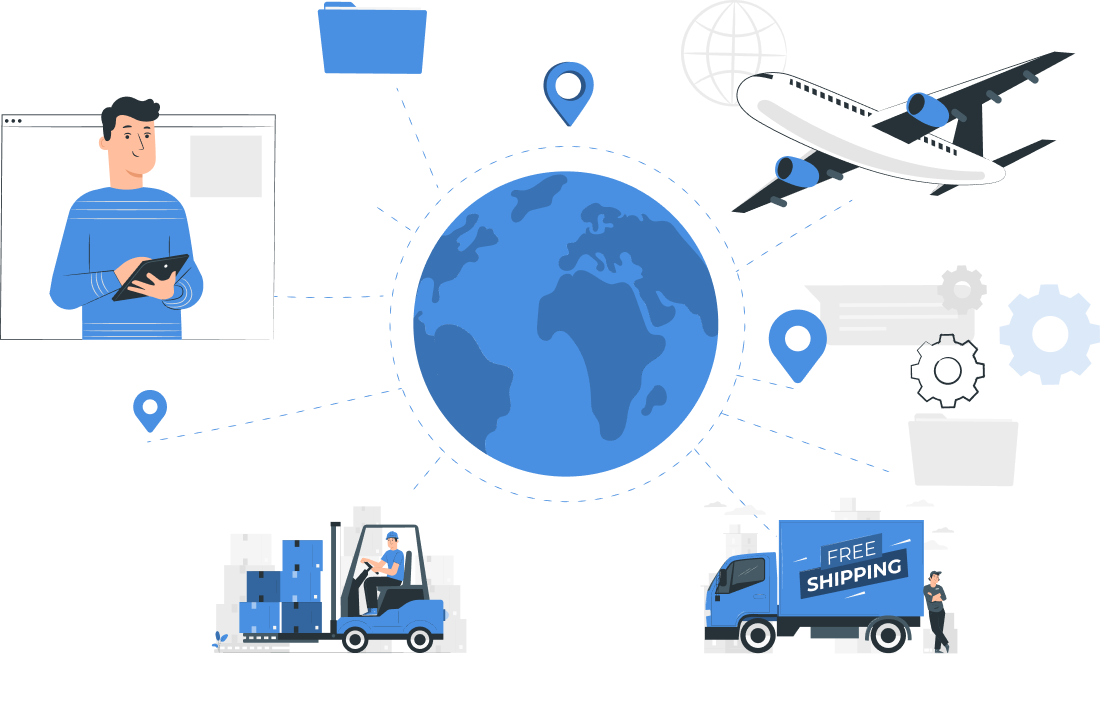Custom software development
With the continuous growth and evolving demands in the logistics industry, businesses need to optimize and streamline their operations. Custom software solutions offer an opportunity to address unique challenges, ensuring that logistics operations are efficient, cost-effective, and customer-centric.
Development Process
- Discovery Phase: Understand the intricate needs and challenges of the client through workshops and stakeholder interviews.
- Design & Prototyping: Create a blueprint of the software, ensuring all requirements are captured.
- Development: Follow agile methodologies, ensuring iterative development and regular feedback.
- Testing: Rigorous quality assurance to ensure the software is bug-free and meets industry standards.
- Deployment & Training: Once approved, deploy the software and train the staff to use it proficiently.
- Maintenance & Support: Offer ongoing support to address any challenges and provide necessary updates.
Benefits
- Operational Efficiency: Streamline processes and reduce manual labor, leading to quicker turnarounds.
- Enhanced Customer Experience: Give customers more control and visibility over their shipments.
- Cost Savings: Minimize resource wastage and improve route planning.
- Scalability: Built to support growth, adapt to future challenges, and integrate with other tech ecosystems.
In today’s competitive landscape, many logistics companies need a tailored solution that not only addresses its current challenges but is also future-ready. We believe that our custom software development services will revolutionize your operations, offer unprecedented value to your customers, and set you apart from the competition.
Platforms choosing and integration
Several popular platforms and ERP systems are widely used for logistics in small and medium-sized enterprises (SMEs). Our experts can analyze your business needs and assist in choosing and customizing the most appropriate SaaS or platform, like the following:
Odoo: An all-in-one business ERP software system that offers a wide range of applications like CRM, project management, ERP modules, inventory, and more.
ePROMIS: ePromis ERP is an all-in-one business management software that handles ERP, CRM, and business intelligence capabilities using an AI-powered, mobile-first platform.
Microsoft Dynamics 365: It manages finances, operations, sales, and customer service, designed specifically for small and medium-sized businesses.
Sage 300: A Windows-based ERP system that runs on Microsoft SQL.
NetSuite: An all-in-one business management suite and ERP platform that encompasses ERP applications, financials, CRM, and e-commerce.
These platforms offer a variety of features to streamline and automate the logistics process, making them a great choice for SMEs.
APIs and Microservices Integration for Logistics Software
In the realm of logistics software, APIs (Application Programming Interfaces) and microservices have emerged as groundbreaking tools that revolutionize how systems communicate and evolve.
APIs act as bridges, allowing different software components to interact with each other. For logistics, this means seamless connectivity between inventory systems, order tracking tools, billing software, and more, regardless of where they are hosted or who developed them. This connectivity ensures real-time data sharing and efficient coordination, vital for logistics operations where timeliness and data accuracy are paramount.
On the other hand, microservices represent a design approach where a software application is composed of small, independent services that run as separate processes and communicate through APIs. Each microservice handles a specific function, such as route optimization or cargo tracking. Splitting functionalities into these distinct services makes logistics software more scalable, maintainable, and resilient. If one service fails, others remain unaffected. Furthermore, individual microservices can be updated, scaled, or even replaced without disrupting the whole system.
Integrating APIs with microservices in logistics software ensures modular development, quick updates, and robust performance, facilitating a faster response to changing business demands. This combination leads to more flexible, adaptable, and efficient logistics operations, capable of delivering enhanced customer experiences in an ever-evolving market.
MVP development
Our service for logistics software Minimum Viable Product (MVP) development is designed to create a simplified version of the logistics software that includes only the core features necessary to solve the user’s problem and provide value. The goal of an MVP is to quickly get a product into the hands of users for feedback and validation of the product concept.
SaaS and PaaS development
Our software engineers and business analysts can assist you in developing Software as a Service (SaaS) and Platform as a Service (PaaS), two cloud-based models that can greatly benefit the logistics industry.
SaaS for Logistics: This involves providing logistics software on a subscription basis hosted on the cloud. Users can access the software online without worrying about infrastructure, maintenance, or updates. Examples of SaaS in logistics include transportation management systems, supply chain management software, and inventory management systems. The benefits include lower upfront costs, scalability, accessibility from anywhere, and automatic updates.
PaaS for Logistics: This provides a platform where developers can build, test, and deploy custom logistics applications. The platform provider manages the underlying infrastructure, databases, and runtime environments. This allows developers to focus on coding the application logic without worrying about infrastructure management. Examples of PaaS in logistics could include platforms for developing custom tracking systems, warehouse management systems, or data analysis tools. The benefits include faster development and deployment times, lower costs, scalability, and flexibility to create customized solutions.
Both SaaS and PaaS models allow logistics companies to leverage the power of cloud computing to improve their operations and efficiency.















































